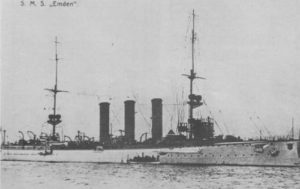- Author
- Clark, Bryan
- Subjects
- Biographies and personal histories, RAN operations, WWI operations
- Tags
-
- RAN Ships
- HMAS Sydney I
- Publication
- September 1989 edition of the Naval Historical Review (all rights reserved)
Republished from the “Clarion” newspaper, Cocos Island, (in 1964), and now to commemorate the 75th anniversary of the original HMAS Sydney’s battle with the German light cruiser, Emden, at North Keeling Island on November 9, 1914, is the following eye-witness account entitled “Uber Alles”, by Hans Heinz Harmes-Emden.
Written in 1931, the German survivor describes the last hours of the Emden which, until its fatal encounter with the Australian vessel, had sunk or captured over 77,000 tons of allied shipping in the Indian Ocean.
Emperor Wilhelm II, by a special act of Cabinet, granted permission to the 150 surviving members of the crew to adopt as their surname that of the ship, Emden, this gesture to act as a propagation of the name through the ages.
Described as an “unassuming, middle-aged man,” Mr Hans Heinz Harmes-Emden, of Shanghai, reviewed, at the request of the “North China Daily News,” his experiences as an engine room petty officer of the famous German cruiser.
In part, the survivor recalled:
At the outbreak of the war the Emden was stationed in the Indian Ocean. With the aid of luck and under the genius of Captain von Mueller we established a good record during our service there. Many ships were captured and many sunk at our hands, while we fortunately escaped with few casualties.
The end of our activities came in November, 1914, at the Cocos Islands when, because of our unfortunate position and the expert tactics of the enemy Commander, who took full advantage of the longer range of his guns and his faster speed, the Australian cruiser, Sydney, blew our ship to bits and killed or captured all but 49 of our crew.

I shall never forget the horror of the last two days of the Emden. We lay in a little coral-locked harbour off the island. Early in the morning of November 9,49 men under Captain Muecke went ashore with the destruction of the Cable Station as their objective. This was easily accomplished. I remember standing on deck with the rest of the crew and watching the mast of the station fall to the ground.
Little groups of men stood on the deck laughing and joking as the sun rose. Everything seemed so quiet and at peace that everybody was happy. Although it may seem as incredible as the stories superstitious old ladies tell, an evil premonition of disaster made me stand out as a gloomy pessimist among my mates. Some of them commented on my low spirits to which I replied that the previous night I had dreamed that the decks of the Emden were drenched in blood and terror, as had happened on the many ships we had successfully fought. I told my mates that I felt that this would be the last sunrise for many of us. Entries in my diary, made before the presence of the Sydney became known, will prove that my intuition was not a product of fancy after the encounter. I later learned that two members of the crew had similar dreams.
My mates had scarcely turned their attention to other matters before the look-out called from the crow’s nest that a ship was approaching. At once the order rang out: “Clear for action.” We thought that this was or must be another old war vessel that we could despatch with ease.
Information had previously reached us that the British (sic) cruiser, Sydney, was convoying a fleet of merchant ships far to the north of us. But by some strange turn of fate the convoy had forsaken the shortest route to their destination, and come a round-about way, thinking in this way to avoid us who might be watching for them on the regular course.
We later learned that a false fourth stack, with which we disguised the Emden, had wobbled while passing another vessel and the word was immediately passed onto the Sydney who came to investigate. As the mast, and subsequently, the outline of the Sydney appeared over the horizon, we at once weighed our anchor and went off, with full speed, to meet her. We had no time to embark our landing party but signalled them that something was wrong. They were not yet able to see our adversary.




